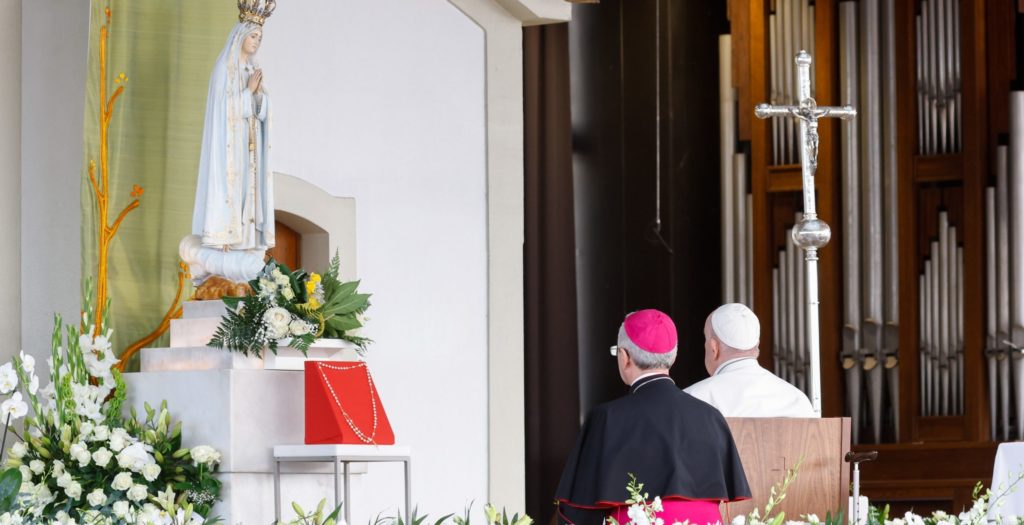Before 200,000 pilgrims at Fátima, many of them with tears in their eyes, Pope Francis called for a new Marian devotional title -- "Our Lady in a Hurry" -- to describe how Mary hastens to care for all her children.
"There are many Marian invocations," told the crowd at the Shrine of Our Lady of Fátima Aug. 5, but one that is not common and should be comes from the biblical account of the visitation when Mary sets off to see her cousin who also is pregnant.
"It's a loose translation, but where the Gospel says she set out 'in haste,' we would say she went out running," he said; "she went out running with that eagerness to be present."
"'Our Lady in a Hurry,' do you like that?" Pope Francis asked his fellow pilgrims. "Let's all say it together: 'Our Lady in a Hurry.' She hurries to be close to us. She hurries because she is a mother."
"Every time there is a problem, every time we invoke her, she doesn't delay, she hurries," the pope told the crowd, which was a mix of young people visiting Portugal for World Youth Day and thousands of locals who came from across the country to Fátima to see the pope.
From the front row of the crowd, Margarida Vieira from Portugal told Catholic News Service that her group of four arrived at 3 p.m. the previous day and spent the night to get a good spot to see the pope. Many pilgrims were sprawled out on yoga mats and in sleeping bags in the hours leading up to the pope's arrival.
Pope Francis' morning in Fátima, about 75 miles north of Lisbon where World Youth Day is taking place, marked his second visit to the Marian shrine. In 2017, he celebrated Mass there to mark the 100th anniversary of the apparitions of Our Lady of Fátima to three Portuguese children.
Fátima also has been connected to Pope Francis' public prayer appeals for an end the war in Ukraine. In March 2022, just over one month after Russia launched its full-scale invasion of Ukraine, the pope consecrated both countries to Mary's immaculate heart, praying before a statue of Our Lady of Fátima in St. Peter's Basilica.
Sister Lúcia dos Santos, one of the three Fátima visionaries, had said Mary requested that Russia be consecrated to her immaculate heart by a reigning pope to bring peace to the world. Previous popes had consecrated Russia to Mary's immaculate heart in various forms but had never mentioned the country by name as Pope Francis did in 2022.
In Fátima, however, Pope Francis made no mention of war or peace in Ukraine or elsewhere, instead putting aside a prepared text to tell hundreds of thousands of pilgrims to invite Mary into their heart.
But Bishop José Ornelas Carvalho of Leiria-Fátima welcomed the pope and introduced the event by turning people's attention to "the war in Ukraine and so many other hotbeds of conflict in the world, which weigh dramatically on the lives and futures especially of children and young people."
Those joining the pope in prayer, he said, were mindful of "the maternal concern of the mother of Jesus, revealed here to three children, simple and poor shepherd children, during a bloody war," World War I.
Matteo Bruni, director of the Vatican press office, told journalists after the ceremony that when the pope prayed in front of the statue of Our Lady of Fátima "he prayed in silence and with pain for peace." Bruni also noted that the fourth mystery of the rosary at the event was a prayer for peace.
The pope had been expected to offer a special prayer to Mary for peace after his remarks at Fátima, but instead the Vatican posted an abbreviated version of it on the pope's Twitter account.
"To you, we consecrate the church and the world, especially those countries at war. Obtain peace for us," the Tweet said. "You, virgin of the way, open paths where it seems that none exist. You who untie knots, loosen the tangle of self-centeredness and the snares of power."
The day before his Fátima visit, the pope did not read two prepared speeches, instead improvising his remarks after joking that his glasses "aren't working" and that he didn't want to strain his vision.
Bruni told reporters, "There is no vision problem. Yesterday morning in the course of the meeting with charitable institutions there was a problem with the lighting that made a reflection on his glasses, and he wasn't able to read."
Speaking off the cuff "is not a vision problem," Bruni repeated, but the "choice of a pastor in regard to the people."
In the Chapel of the Apparitions, marking the exact spot where the three children saw Mary in 1917, Pope Francis prayed the rosary with 106 young disabled and sick people and six incarcerated youth.
The chapel, located in the center of the shrine, "is like a beautiful image of the church, welcoming, without doors, so that all can enter," he said.
And at Fátima, too, Pope Francis noted, "we can say that all can come, because this is the house of the mother, and a mother always has her heart open to all of her children."

